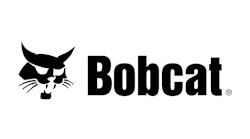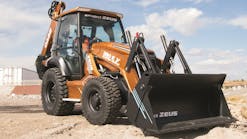OK, OK, it’s a broken record—the very slow trickle of trained, competent, and responsible operators entering the construction industry—and all those jobs out there waiting. Construction isn’t alone. Health care and municipal utilities are facing the same challenge. Junior colleges and trade schools are often held up as prime sources of trained and qualified applicants, and mega-equipment manufacturers and software providers offer dealer-sponsored training and internships, some in conjunction with two-year degree programs. But the process can be slow. What happens when the marketplace is booming and you’ve got the equipment, but not the operators? Where do you go if you’ve got a big gaping hole in your crew and you need to fill it, now?
Ditch Witch simulator training
And what about the people on the other end of the equation—the new generation of untrained, unskilled, and inexperienced laborers looking for a job, any job, perhaps even with a vague hope of starting a career? The days of motivated and focused young men and women showing up on your doorstep are long gone. Nobody goes door to door anymore; they sit on the computer, traversing cyberspace for leads, hoping something will jump out at them. These days it’s up to industry to market itself and steer potential applicants in the right direction. This means not just contractors, but also equipment andsoftware manufacturers, who have to get in there and mix it up.
In tight markets, where a variety of industries are competing for the same labor pool, and applicants have to be trained to do the job you’re hiring them to do, the impulse is for a quick fix—get ’em in, get ’em up to speed, and get ’em out the door and on the machines. But quick training serves no one’s purpose. Vendor training aimed at filling an immediate and specific market succeeds best when it follows a set of common sense principles:
- Be a partner, not a vendor.
- Know your market.
- Know whom you’re training.
- Follow a logical progression.
- Provide flexibility.
“We’re in this together,” says Greg Wolfe, director of training for Ditch Witch, who should know what he’s talking about, with two decades of providing training. “We want people to be successful and profitable with our products.”
“We understand we’re in a partnership with our customers, says Mike Anderson, President of Ditch Witch Central California. “If we help them succeed, we’ll be successful too.”
For those who may not be familiar: Ditch Witch makes horizontal directional drilling (HDD) equipment. Trenchless installation of underground pipe, conduit, and cable makes for minimal impact on surrounding areas, less disruption of traffic, lower cost, deeper and/or longer installation, shorter completion times, and environmental safety, and is particularly suitable for urban sites. Ditch Witch equipment is all-American built at The Charles Machine Works Inc. in Perry, OK, which has a long history of practical innovation. The company’s compact trencher has twice been named one of Fortune magazine’s 100 best American-made products.
Utility and lower costs aside, HDD requires unique operator skills. The drilling head isn’t visible during operation so location and guidance are important. Operators must have complete information about existing utilities and plan safe alignment before they start. “The major driving force behind the training we’re offering today is fiber buildout,” says Ditch Witch senior training specialist Brian Grim. “There’s a huge demand in America for replacement infrastructure, but the skill set that exists in the marketplace today is pretty thin.” To say the least of a labor pool that not only lacks knowledge and industry experience, but is also short on hands-on skills—and is accustomed to viewing the world via smartphones and computers.
The first thing Ditch Witch did to address these dueling challenges was to develop an online training program, which it offers free on its website. The strategy helps catch jobseekers trolling on the Internet—as well as novice operators newly hired by desperate contractors who now need to train them. The online program provides an accelerated introduction to the foundational elements of HDD and includes six courses: equipment/technique overview, best operating practices, drill pipe, tracking, HDD tooling, and drilling fluids. It’s designed as a first step for new operators, who can then go on to the classroom or a simulator at a Ditch Witch dealership or its Oklahoma factory.
Each online course takes approximately 1.5 to two hours, with a total time of eight to 12 hours, and operators receive a certificate of completion. One advantage, both for the trainees and the operators who are already on the job, is the typical benefit of self-paced online instruction—and it can be accessedat the operator’s discretion including via a mobile device.
With most contractors, the next stop for their novice operators can be in-classroom training that expands on the basics they picked up online. Courses are taught by experienced HDD operators at a ratio of one instructor per five students. Depending on the students’ inclination and the company’s assessment of its needs, operators can skip this step and go directly to the simulator.
Ditch Witch has recently upgraded its simulator training to reflect a more accelerated training philosophy and appeal to new-generation learners. Simulators have long been used as a cost-effective way to provide equipment novices hands-on experience without the time, cost, and liability of putting inexperienced operators on machines. This makes them a no-brainer for accelerated and/or targeted training. The Ditch Witch simulators utilize a two-screen system and have an updated joystick. Operators can simulate drill controls on one screen and get a 3D look at the bore-path on another screen. They can choose from a variety of drills, soil conditions, piping options, and downhole tools to best simulate real-life job sites. Students can have unlimited practice and are given constructive feedback at the end of their session.
The new simulators are driven by laptops, which improves mobility and makes dealer access more efficient. They can also be used to market the industry at tech and trade schools and job fairs. Simulator time is also available to more experienced operators who want to go back for a refresher.
Depending again on the discretion of their employers, operators can then move onto the job site. Some dealerships have simulated job sites, while other operators go to actual jobs, under the contractor’s supervision. “It’s extremely important to carry the training through to the actual job site,” says Anderson, “because things happen there that will never happen in other areas.”
“We do our classroom training, simulator training, and then in-field training, and when we leave, they’re a good group, with all the basics to be a great group.”
Ditch Witch proves what’s possible and that it’s not rocket science. We’re not talking one of those mammoth equipment manufacturers with resources that make your mouth water. We’re talking about an innovative company that recognized a void in a specialized segment of its market, listened to what its customers needed, acknowledged its role in making that happen, and got down to the business of doing it. Not bad. Not bad at all.









